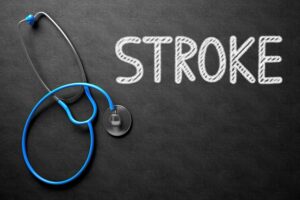According to the American Stroke Association, someone in the United States has a stroke every 40 seconds. It is the leading cause of long-term disability and nearly three-quarters of all strokes occur in those who are age 65 and older. Two risk factors that can be controlled: high blood pressure and smoking.

For those that have a stroke, if they receive treatment within three hours, they may avoid significant brain damage due to a clot-busting medication that can be administered. For this reason, it’s crucial that caregivers and family members know the signs to be aware of. The American Stroke Association has developed a mnemonic to make it easy to remember: Act FAST. The acronym stands for Facial drooping, Arm weakness, Speech difficulties, and Time to call emergency 9-1-1.
The good news is that people can continue to recover from a stroke for many months if not years. This is why stroke rehabilitation is so important and should be started as soon as possible. Rehabilitation may involve several different types of therapy, depending on the patient’s needs.
- Physical Therapy. The goal of physical therapy will be to help the patient relearn activities that have been “lost” post-stroke. These may include walking, sitting, and standing. They will help their patients learn how to use mobility devices safely and effectively, and increase their range of motion and strength in both the affected and the unaffected limbs.
- Occupational Therapy. This type of therapy focuses on the everyday activities that the person may have forgotten how to perform. This may include simple actions such as eating, drinking, dressing, bathing, reading, writing, and cooking.
- Speech Therapy. This type of therapist helps the patient either relearn a language or gives them tools to make communication easier. They can often help those recovering from a stroke regain lost abilities in writing, comprehending, speaking, and listening. Memory and problem solving may need to be addressed and supported.
The goal of rehabilitation is to help the patient become independent and lead the highest quality of life possible. Nutritional needs will also be addressed. It’s not just about relearning what was lost, but also about new ways to perform tasks that compensate for any lasting disabilities. Repetitive practice is the key, just as when you tried to learn a new skill such as how to play the piano or learn the art of tennis.
Senior Care Provider.
A senior care provider has cared for many seniors faced with the task of undergoing rehabilitation after a stroke. They understand their unique needs, including the frustration they sometimes feel as they relearn or compensate for what was once second nature. Companionship, as well as assistance with the everyday tasks of living, is an important component to the quality of life achieved following a stroke.
If you or an aging loved one are considering hiring senior care in Charleston, SC, contact Heart of the Carolinas Home Care at 864-991-3116. Providing Home Care Services in Greenville, Simpsonville, Greer, Anderson, Spartanburg, Mauldin, Seneca, Laurens, Charleston, Columbia and the surrounding areas.
Resources
http://www.strokeassociation.org/STROKEORG/AboutStroke/Impact-of-Stroke-Stroke-statistics_UCM_310728_Article.jsp#.WX_gZ4Tytpg
http://www.strokecenter.org/patients/about-stroke/stroke-statistics/
- Navigating the Emotional Aspects of Alzheimer’s Disease - April 12, 2024
- Tips and Tricks for Helping Seniors Handle Their Allergies - April 11, 2024
- Encouraging Seniors to Embrace Vegetables - March 15, 2024
